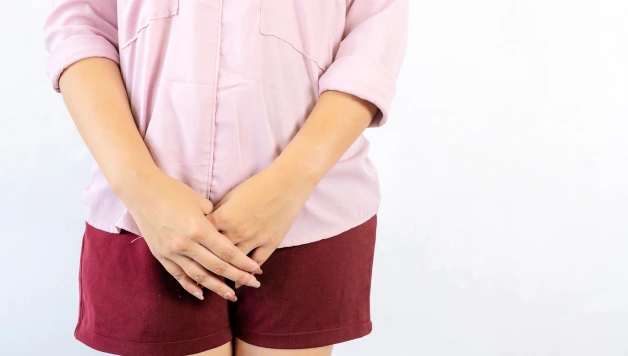Menopausal vaginal dryness is a common problem experienced by many women during menopause. Vaginal dryness and itching can be uncomfortable and interfere with daily activities, including sexual intercourse.
These symptoms are often caused by decreased estrogen levels, which can occur during menopause, breastfeeding, and specific medical treatments. Here are some causes, symptoms, and treatment options for menopausal vaginal dryness and itching.
Key Takeaways
- Menopause can cause vaginal dryness due to decreased estrogen levels.
- Symptoms include itching, burning, pain during sex, and vaginal discharge.
- Treatment options include vaginal moisturisers, lubricants, hormonal therapy, and lifestyle changes.
- Natural remedies for vaginal dryness, like phytoestrogen-rich foods and herbal supplements, can also help alleviate vaginal dryness after menopause.
Coping with Menopausal Vaginal Dryness:
Menopausal vaginal dryness is a common problem experienced by many women during menopause. Vaginal dryness and itching can be uncomfortable and interfere with daily activities, including sexual intercourse.
These symptoms are often caused by decreased estrogen levels, which can occur during menopause, breastfeeding, and specific medical treatments. Here are some causes, symptoms, and treatment options for menopausal vaginal dryness and itching.
Causes of Vaginal Dryness
Vaginal dryness can be caused by several factors, including:
- Menopause: Vaginal dryness is caused due to decreased estrogen levels, often during menopause. Estrogen helps in keeping the vaginal tissue healthy and moist.
- Breastfeeding: Estrogen levels also decrease during breastfeeding, which can cause vaginal dryness.
- Medications: Anti-estrogen drugs used to treat breast cancer can also cause vaginal dryness.
- Medical treatments: Radiation therapy and chemotherapy for cancer treatment can damage the vaginal tissue and cause dryness.
- Emotional stress: Chronic stress can affect hormone levels, including estrogen, leading to vaginal dryness.
- Allergies: Allergic reactions to chemicals in soaps, detergents, or lubricants used during sex can cause vaginal dryness.
- Sjogren’s syndrome: Sjogren’s syndrome, an autoimmune disorder, can cause dryness in various body parts, including the vagina.
- Smoking can decrease blood flow to the vaginal area, leading to dryness.
Symptoms of Vaginal Dryness
The symptoms of vaginal dryness can vary from person to person, but common symptoms include the following:
- Dryness or itching in the vaginal area
- Burning or stinging sensation in the vagina
- Pain or discomfort during sexual intercourse
- Spotting or light bleeding during or after intercourse
- Vaginal discharge that is thin or watery
- Frequent urinary tract infections (UTIs)
- Decreased sexual desire
- Difficulty achieving orgasm
How to Treat Vaginal Dryness
Natural Remedies for Vaginal Dryness
Several natural remedies may help alleviate vaginal dryness:
- Increase water intake: Drink plenty of water to help hydrate the body and promote moisture in the vaginal area.
- Consume phytoestrogen-rich foods: Foods high in phytoestrogens, such as soybeans, flaxseeds, and chickpeas, may help increase estrogen levels and alleviate vaginal dryness.
- Use a vaginal moisturiser: A natural vaginal moisturiser, such as coconut or vitamin E oil, can help temporarily relieve vaginal dryness.
- Engage in sexual activity: Regular sexual activity can help increase blood flow to the vaginal area and promote natural lubrication.
- Practice good hygiene: Keeping the vaginal area clean and dry can help prevent irritation and dryness. Avoid harsh soaps or douches, and opt for gentle, fragrance-free products.
Vaginal Dryness Treatment
The treatment for vaginal dryness depends on the underlying cause. Here are some standard treatment options:
- Hormone replacement therapy (HRT) involves taking estrogen supplements to help replenish the body’s estrogen levels. It can help alleviate vaginal dryness and other symptoms of menopause. However, HRT may not be suitable for everyone and can have potential risks, so it’s essential to consult your healthcare provider about the risks and benefits.
- Antifungal or antibiotic medications: If a bacterial or fungal infection causes dryness and itching, your healthcare provider may prescribe antifungal or antibiotic medications to treat the condition.
- Lifestyle changes: Making specific lifestyle changes, such as quitting smoking, staying hydrated, and avoiding harsh soaps or douches, may help alleviate vaginal dryness.
- Vaginal estrogen therapy involves applying estrogen directly to the vaginal tissue using creams, tablets, or rings. It can help relieve vaginal dryness and improve vaginal health. Vaginal estrogen therapy may be a safer alternative to systemic HRT and a better option for women with only vaginal symptoms.
- Moisturizers and lubricants: Over-the-counter moisturizers and lubricants can help provide temporary relief from vaginal dryness. They provide moisture to the vaginal area and can be used during sexual activity to reduce discomfort.
Estrogen Cream for Vaginal Dryness
Estrogen cream is a type of vaginal estrogen therapy that can be used to treat vaginal dryness. It works by replenishing the estrogen levels in the vaginal tissue, which can help improve vaginal health and relieve dryness and other associated symptoms.
Estrogen cream is used directly on the vaginal tissue using a small applicator. It is typically used for weeks to months, depending on the symptoms and the individual’s response to the treatment.
Estrogen cream can be a safe and effective treatment for vaginal dryness, mainly when used under the guidance of a healthcare provider. However, it is important to note that estrogen therapy may have potential risks, such as an increased risk of certain types of cancer, blood clots, and stroke. Thus, discuss the risks and benefits of estrogen therapy with your healthcare provider before starting treatment.
Non-estrogen Cream for Dryness
If you cannot use estrogen therapy or prefer a non-estrogen option for treating vaginal dryness, some non-hormonal creams and lubricants can provide relief. Here are some examples:
- Vaginal moisturisers: Vaginal moisturisers, such as Replens or Luvena, are non-hormonal products that can be used to provide relief from vaginal dryness. They are applied regularly, usually every 2-3 days, and work by helping to restore natural vaginal moisture.
- Hyaluronic acid gel: Hyaluronic acid is a substance that naturally occurs in the body and helps to retain moisture. There are vaginal gels that contain hyaluronic acid that can be applied as needed to help relieve vaginal dryness.
- Water-based lubricants: Water-based lubricants, such as Astroglide or KY Jelly, can be used during sexual activity to reduce discomfort caused by vaginal dryness.
In conclusion, vaginal dryness is a common symptom that can occur during menopause due to declining estrogen levels. Still, it can also be caused by other factors such as medications, certain health conditions, and lifestyle habits. The symptoms of vaginal dryness can range from mild to severe and can cause discomfort and pain and even affect sexual function.
Several treatment options are available for vaginal dryness, including hormonal and non-hormonal therapies. Hormonal therapy, such as estrogen cream or vaginal estrogen therapy, can be effective in restoring vaginal moisture and improving symptoms.
Non-hormonal treatments, such as moisturisers, lubricants, and hyaluronic acid gels, can relieve vaginal dryness.
Most importantly, discussing the most appropriate treatment for your needs with your healthcare provider is crucial. Making lifestyle changes, such as staying hydrated and avoiding irritants, can also help alleviate symptoms and improve overall vaginal health.









